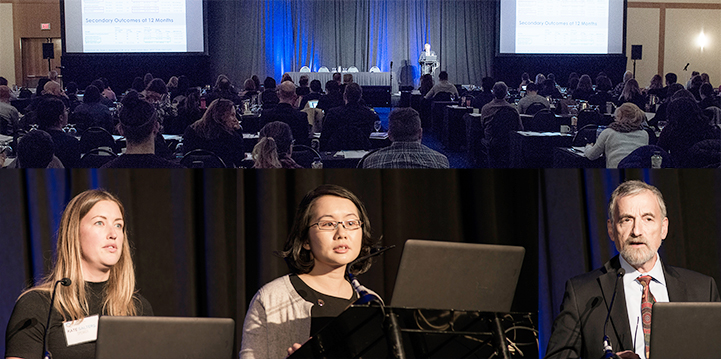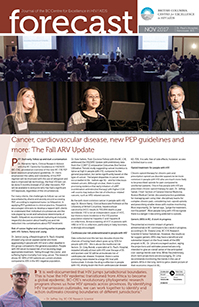
PEP: Start early, follow up and start a conversation
Dr. Marianne Harris, Clinical Research Advisor with the BC Centre for Excellence in HIV/AIDS (BC-CfE), provided an overview of the new BC-CfE PEP (post-exposure prophylaxis) guidelines. Dr. Harris emphasized the safety and tolerability of the PEP regimen will be improved with the use of raltegravir and due to improved lab technology, the final HIV test can be done 3 months (instead of 12) after the event. PEP will be available to everyone who has had a significant HIV exposure, regardless of the circumstances.
For many clients, the challenges to follow-up can be exacerbated by shame and anxiety around accessing PEP, according to registered nurse Liz Kirkpatrick. In applying PEP guidelines to clinical practice, Fitzpatrick encouraged clinicians to develop a rapport with clients to understand their individual circumstances and the role played by social and behavioral determinants of health. Kirkpatrick recommends nurturing an inclusive, respectful discussion about healthy sex and risk reduction into conversations about PEP treatment.
Risk of cancer higher and occurring earlier in people with HIV: Salters, Ramji and Leung
Dr. Janice Leung, a Respirologist at St. Paul’s Hospital, showed lung cancer appears earlier and more aggressively in people with HIV and is often deadlier in this group compared to the general population. People with HIV are at increased risk of not receiving stage appropriate treatment, “falling through the cracks”, and suffering higher mortality from lung cancer. The research shows 40-84% of HIV patients are current smokers compared to 20% in the HIV-negative population.
Dr. Kate Salters, Post-Doctoral Fellow with the BC-CfE, addressed the HIV/ARV Update with preliminary data from the COAST (Comparative Outcomes And Service Utilization Trends) study suggesting cancer incidence is twice as high in people with HIV, compared to the general population, but varies significantly based on the type of cancer. The largest disparities in cancer rates occur earlier in life – before age 50 – and for infectious-related cancers. Although unclear, there is some promising evidence that early initiation of cART (combination antiretroviral therapy) with higher CD4 cell counts may reduce the risk of infectious-related cancers, such as HPV-related cancers.
As the sixth most common cancer in people with HIV, says Dr. Alnoor Ramji, Clinical Associate Professor at the University of British Columbia, hepatocellular carcinoma (HCC) results in 700,000 deaths a year worldwide. HIV is not an independent cause of HCC, but there is more incidence in the HIV positive population related to Hepatitis C and Hepatitis B co-infections. Active screening of HCC in persons with HBV or HCV co-infection, particularly in baby boomers, is strongly encouraged.
Cardiovascular risk underestimated in people with HIV
Data collected over the last two decades shows the chances of having heart attack goes up by 50% for people with HIV – this is above the traditional risk factors. Dr. Greg Bondy, a specialist at St. Paul’s Hospital, revealed virtually all men with HIV over the age of 35 and women over 50 will be at moderate risk of cardiovascular disease. However, there is some promising news related to a large HIV trial with Evolocumab. It shows the drug is effective in people with HIV, driving down risk from cardiovascular disease 60-70%. It is safe, free of side effects; however, access is limited due to cost.
Opioid treatment for people with HIV
Chronic opioid therapy for chronic pain and prescription opioid use disorder appears to be more common in people with HIV who are much more likely to be prescribed opioids for pain compared to uninfected patients. One in five people with HIV are prescribed chronic opioid therapy for pain. Dr. Jeffrey Samet, Chief, Section of General Internal Medicine, Boston Medical Center, discussed practice guidelines for managing pain using inter-disciplinary teams for complex chronic pain, considering non-opioid options and prescribing smaller doses with routine monitoring. Most importantly, Dr. Samet says, “judge the treatment, not the patient”. Most people living with HIV recognize there is a danger in becoming addicted to opioids.
Generic ARVs in BC: A work in progress
The potential economic impact of generic antiretrovirals in BC continues to be a work in progress, according to Dr. Viviane Lima, BC-CfE Research Scientist & Senior Statistician. However, the results so far suggest generic ARVs may have a beneficial and substantial impact on the fiscal needs of the ARV program in BC. Dr. Lima encouraged caution, saying the projections and estimates presented are only intended to give an overall sense of the anticipated cost-savings trends over time. While the preliminary, short-term projections are encouraging, Dr. Lima recommends monitoring the trends in the use of generic ARVs in the long-term to get a clearer picture of their economic impact in BC.

